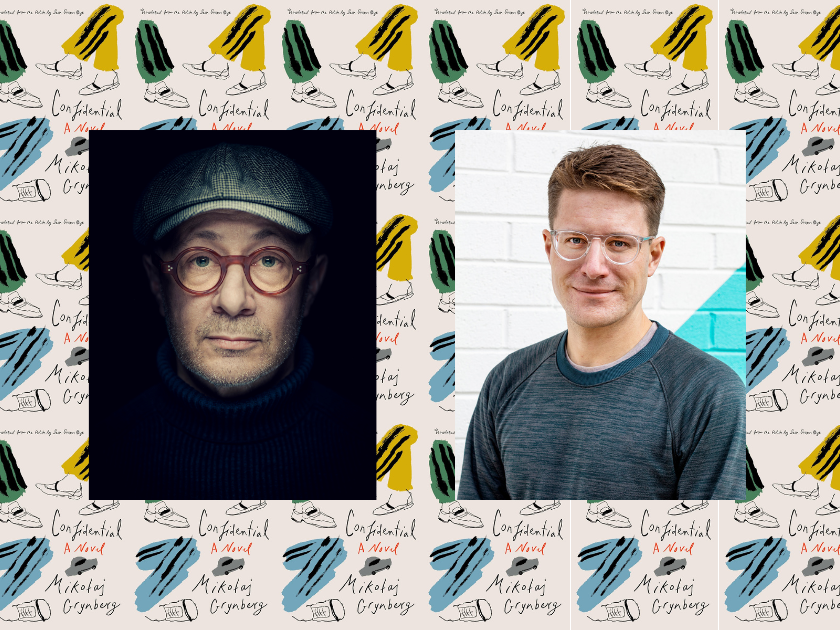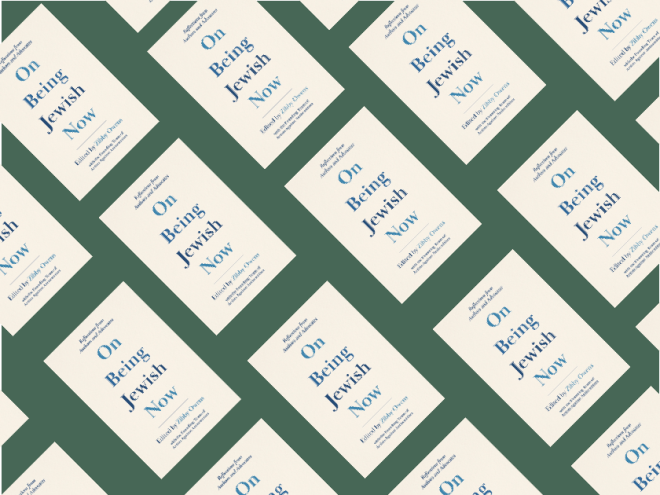
Left to right: Author of Mikołaj Grynberg by Jacek Poremba
Author photo of Sean Gasper Bye by Randl Bye
Mikołaj Grynberg is Poland’s preeminent Jewish writer. Working across reportage, fiction, and photography, Grynberg has developed a mode of storytelling that embraces the complexity of Jewish experience in post-war Poland – one which prizes voice over conventional narrative, and which relishes in the poetic potential of ambiguous memory. Sean Gasper Bye has translated two of Grynberg’s books into English: the short story collection, I’d Like To Say Sorry, But There’s No One To Say Sorry To (2021) and, most recently, his novella Confidential, which will be released by The New Press in January 2025. In the following conversation with Madeleine Wulfahrt, Grynberg and Gasper Bye discuss their translation process, the universal humanity of Jewish stories, and more.
Mikołaj’s answers were translated from the Polish by Madeleine Wulfahrt.
Madeleine Wulfahrt: I’d Like To Say Sorry, But There’s No One To Say Sorry To was your first work of fiction, structured as a collection of first-person vignettes. Confidential, which charts the story of a Jewish family in post-war Poland, is your first novel. And yet, it maintains something of I’d Like To Say Sorry’s fragmentary, anecdotal nature. It feels important to point out that, for the most part, Central-East-European literary establishment is far less concerned with generic distinctions than its Anglophone counterpart – books, such as your own, which occupy a grey area between the novel and the short story collection are not perceived to be “sui-generis” as they might be in the US. Did you conceive of Confidential as more of an overarching narrative from the very beginning, or was its structure something that emerged during the writing process?
Mikołaj Grynberg: When I started working on Confidential, I thought I was writing another short story collection. However, as I was writing, it became clear that each story helped paint the portrait of a particular family, which eventually became the book’s collective protagonist. From that moment on, it was only a matter of time before the book acquired a new nomenclature. I watched with interest as Confidential moved from the “short story” shelf to the “novel” shelf.
MW: I was reminded, reading Confidential, of Odessa Tales and Red Cavalry—the Soviet Jewish writer Isaac Babel’s collections of artfully interconnected short stories. Do you have a particular relationship to Babel? Were his stories on your mind while you were writing Confidential?
MG: I appreciate Babel for the way in which he “helps himself” to historical facts and to his own biography. He was a great writer; he had restraint, and his storytelling had momentum. The trick is to go deep into a story while maintaining simplicity of form and legibility of message.
MW: The Polish title of I’d Like to Say Sorry, But There’s No One To Say Sorry To is Rejwach: the colloquial Yiddish word (רווח) for racket or din. In one of the stories in Confidential, you write about a Jewish home for the elderly in France in which Yiddish has become the lingua franca — the language to which the home’s senile inhabitants have returned from the various languages of assimilation. I was curious — are you aware of Yiddish influencing your writing, whether in the form of literary and cultural history, or even in the familial vocabulary passed down through generations?
MG: The word “rejwach” is an interesting example of Yiddishism in Polish. In Yiddish it means “profit,” and in Polish it means “hustle and bustle.” The word wandered, and in its journey the meaning changed.
I myself have never really been in a Yiddish-language environment. My grandparents spoke Yiddish when they wanted to exclude my parents, and then when they wanted to exclude me. It didn’t happen very often. However, I would often hear them whisper certain phrases under their breath: oj, hab nysz kakojeh (I don’t have the strength). So I didn’t get much of the language, but “Yiddish thinking,” for sure. I think it was the jokes that I heard from such a young age that played the biggest role. The fact that they are told for a reason, and that it usually has something to do with teaching you something — their particular structure, and how it’s no accident that they have no unnecessary words or sentences in them. It was a good education in story writing. I think Babel went through it, too.
MW: Several of the chapters in Confidential are named for Jewish holidays — “Hanukkah,” “Sukkot,” etc — but few of them contain more than a passing reference to the holiday at hand. I’m curious to hear more about the relationship between the Jewish calendar and the structure of Confidential.
MG: I’m so glad you paid attention to the Jewish calendar. You’re the only person who’s noticed it. It was important to me that Jewish time flowed through the book. The chapters bearing titles of Jewish holidays themselves aren’t about the holidays themselves. I treated them as metaphors.
MW: An image that stayed with me long after finishing Confidential was the collection of napkins covered in spilled coffee in “Coffee Marks.” A mother and son share a tremor which causes their hands to shake uncontrollably. Over the years, their shaking hands have spilled a great deal of coffee on napkins, each of which has been saved and filed away in a desk drawer. The image seems to me to encapsulate so many of the book’s major themes — the physical manifestations of trauma, and the messy stains of history that the family has to sort and contend with. Could you speak more about the origins and significance of “Coffee Marks”?
MG: It’s the best feeling when you write a small text, then you find that many important topics have crystallized in this short, discrete passage. The napkins with coffee stains on them are, above all, souvenirs of meetings. Stowed away in the desk drawer for such a long time, they preserve their memories and smells – both of which will eventually begin to disappear. Eventually, a new generation will come to clear out the abandoned desk and throw away this bizarre collection of stains. They’ll throw it away, because there won’t be any memories on those napkins – because they were really just in their heads and hearts.
MW: At the launch of Confidential at Columbia University last December, you said that “subjects that come from the inside are always more interesting.” Can you speak to your experience writing “from the inside,” when your characters so often find themselves “on the outside” of the Polish Catholic majority?
MG: I think, first and foremost, that I meant that it is interesting to touch on topics that seem more important to us than to others.
Each of us lives in their own reality, and none of them is one-dimensional. Indeed, I live in a country that still defines itself as Catholic, although careful observation of current trends will soon force us to reckon with this opinion.
I have no doubt that a place outside the majority is far more interesting for a writer.
Each of us lives in their own reality, and none of them is one-dimensional.
MW: In a sense, your prose renders the division between the Jewish minority and Catholic majority in Poland obsolete — it subverts that very division by showing that Jewish stories are universal. In the anglophone literary sphere, where a far higher percentage of your readers are likely to be Jewish themselves, do you perceive a difference in the way Confidential is positioned?
MG: I recognise that there is no greater compliment than that of universality — thank you so much for saying so. I think that’s what writing is all about — finding subject-pretexts. Those which tell a smaller story, actually tell a greater one.
As for the obsoleteness of the division between the Catholic majority and the Jewish minority, I cannot agree. It has its place in Poland and it’s a part of the national landscape. And it would not disappear even if there were no Jews in Poland, which I hope will never happen.
MW: Sean, this was the second book of Mikołaj’s which you’ve translated, and the first time you’ve translated multiple books by the same author. Was the process of translating Confidential different from that of translating I’d Like To Say Sorry, But There’s No One To Say Sorry To? If so, how?
Sean Gasper Bye: While the books are structured very differently, their styles have much in common. Mikołaj’s writing has the feel of saying exactly what it needs to and no more, and what’s unsaid is as important as what’s said. These were lessons I learned with Sorry that I could apply in Confidential. The biggest difference was that Sorry was made up of monologues, while Confidential has a narrative voice that I needed to define.
MW: At Confidential’s launch last December, Mikołaj said that if he had thought he were writing for a majority Jewish audience, he wouldn’t have written Confidential at all: “Jews know these stories,” he said. You pointed out that, while Polish Jews may know these stories, Confidential portrays an aspect of contemporary Jewish experience which would be foreign to many in, for example, a Jewish American audience. How did you anticipate or perceive the significance of Confidential’s English-language release?
SGB: It goes without saying that the postwar Jewish experience in the United States has been very different from that in Poland. I find Americans often assume there are no Jews left in Poland or have difficulty understanding why Jews would want to live there. So part of what I value about Mikołaj’s work is that it testifies to Poland’s Jewish presence and Jewish present, in a way that encourages nuance and sympathy. I wasn’t sure how readers here would respond to having their assumptions challenged; I’m very pleased to say the reception so far has been warm.
MW: I’m curious if you read any other books — in Polish or in English — to prepare for translating Confidential?
SGB: I read as much as I can about Jewish history and culture in Poland to make sure I’m making well-informed choices when translating Mikołaj. When capturing his style, I often think about the work of certain Polish reportage writers who favor minimalism, such as Hanna Krall and Wojciech Jagielski. A friend once compared translating them to making an abstract painting using only two or three very careful brushstrokes.
Part of what I value about Mikołaj’s work is that it testifies to Poland’s Jewish presence and Jewish present, in a way that encourages nuance and sympathy.
MW: I know that you work closely with Mikołaj throughout the translation process — how do you believe this affects your final translation? Is there a particular aspect of your collaboration which manifests itself in your English rendering?
SGB: The help and guidance I get from Mikołaj is crucial. Firstly, as a non-native Polish speaker, I always have lots of questions for my authors as I try to pin down precise meanings and connotations. Secondly, Mikołaj has often shared with me the background or inspiration for parts of his writing. All of this helps me understand the text better, which is the fundamental task of the translator — if you can’t understand the text, you can’t translate it.
MW: As I mentioned in a question to Mikołaj, so much of Confidential’s narrative is intricately intertwined with its characters’ voices and stories. Was the Polish original particularly idiosyncratic or colloquial for that reason? How did you approach finding unique yet corresponding voices for the characters in English?
SGB: In this book, the question of orality came up most in the jokes certain characters tell. Translating humor is always fiendishly difficult. The first thing is you have to dissect the joke, understand what exactly makes it funny. Then you have to adapt it a little, not just so the word play works, but to match the rhythms and structural conventions of English joke-telling. I sometimes test out my versions by working them into conversations with unsuspecting friends to see if they laugh.
MW: Olga Tokarczuk provided a blurb for the English-language edition of Confidential. In the West, Tokarczuk has come to represent Polish literature on the world stage — particularly after winning the Nobel Prize for Literature in 2018. More surprisingly, through the monumental anglophone reception of The Books of Jacob, Tokarczuk has also become associated with Polish literary representations of Jewishness, though she herself is not Jewish. How do you see Grynberg’s English-language releases as contributing to the reception of Polish literature in the West?
SGB: I think for US readers Polish literature is mainly a blank slate. Tokarczuk is the only “household name” writing today, but no one else in Poland really writes like her. I see Polish literature as having huge variety and creativity, a refreshing antidote to “MFA style” and commercially driven genre conventions. But I think Mikołaj’s work is truly unique, whether in Polish or in English, and it excites me to invite Anglophone readers into something wholly new.
MW: Your translation practice almost always prioritizes marginalized Polish voices. How do you see your work with Grynberg as part of this positionality, and what upcoming projects do you have in the works?
SGB: I share Mikołaj’s view that the most interesting stories are on the margins. It’s also a pet project of mine to promote global Jewish voices. Jewish culture is so integral to Western culture (and not only) that I think we have a lot to learn from all the varieties of Jewish experience.
My current project is a new translation of Kazimierz Moczarski’s memoir Conversations with an Executioner, out with Duckworth Books in 2026. Moczarski was a World War II resistance fighter unjustly imprisoned after the war. For nearly a year, he shared a cell with the German general who oversaw the destruction of the Warsaw ghetto. Moczarski made it his business to understand what turned that man into the monster he was; the resulting book is chilling and eye-opening.



